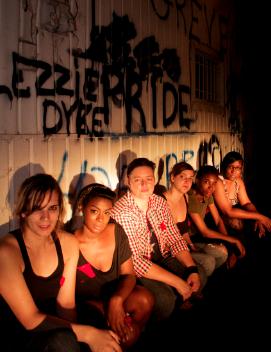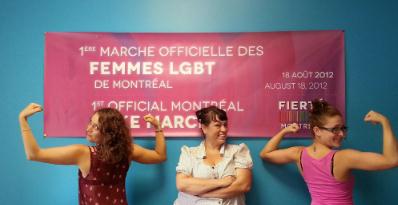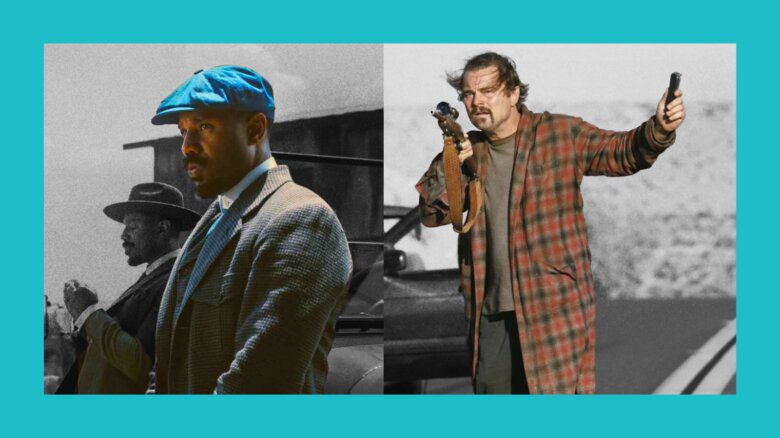
The Radical Dyke March Collective. Credit: Rachel Vanier
For years Montreal lesbians have been asking the question: why no dyke march?
Nearly every other major urban centre in North America has one, and it seemed a marked absence in a city as large and vibrant as la belle ville.
“There’s one in San Francisco, Toronto, New York — all the major Prides have them,” says Mylène St-Pierre, a special projects manager with Fierté Montréal who was hired to create more diverse and inclusive events for the organization this year. “I knew I would be doing this contract — I think it was confirmed in February. So I started asking around: what would you like to see for Pride and women’s events? Dyke march came up over and over again.”
Interest in holding the event started to reach a tipping point, and, this year, Montreal dykes went from having no dyke march to having two.
Yep, two.
Two separate groups began organizing Montreal dyke marches independently earlier this year — each taking radically different approaches. One group has a feminist, anti-capitalist, grassroots, community-organizing focus. The other has a goal of integrating within the structure of Fierté Montréal and taking up space within a sponsorship-oriented, traditionally male-dominated community institution.
Fierté Montréal is organizing what it calls the first official dyke march — and it’s certainly the first dyke march in Fierté Montréal’s history. This event offers a space that’s open to all queer women, as well as allies and families, to march together, take up space and celebrate queer women in the context of Pride. The dyke march will be part of the lineup of official Pride events this year and will kick off Fierté’s Community Day the morning of Saturday, Aug 18.
The Fierté march will include a performance-art project called Hole-y Army, a trans-positive sea of more than 100 genital puppets that will be carried by marchers. The project was created by artists Ariel Speedwagon and Coral Short. Earlier this summer, Hole-y Army appeared in the New York City and Toronto dyke marches. After taking part in the Montreal Dyke March, the project goes to the Ottawa Dyke March on Aug 25.
“It’s about hosting something that will be welcomed and appreciated and is needed to give visibility to a whole range of queer, LGBT women,” St-Pierre says. “The first marches in Montreal were organized by dykes. They weren’t necessarily called dyke marches. They were Pride marches. Definitely political, but for everyone. As part of this Dyke March, I want to honour the women that paved the way in the ‘80s.”
The more grassroots event, dubbed the Radical Dyke March, is being organized by a group of seven community members called the Radical Dyke March Collective (RDMC). It is set to take place the evening of Tuesday, Aug 14, and the idea behind this march is to have a community-run, community-oriented event created by and for dykes that isn’t tied to any institutions or commercial interests. Anyone who identifies as a dyke or a lesbian is welcome to attend. The event is trans-positive and bi-positive.
“In the spirit of the Lesbian Avengers, who organized the first Dyke March in Washington [DC] in 1993, we’re organizing this Dyke March as a massive collective coming out of lesbians in Quebec!” reads the RDMC’s statement about the event. “This march is a recognition that various types of oppression specific to lesbians have existed throughout history and still persist.”
Despite the common goals of dyke visibility and community mobilization, the divergent politics of the two groups made it impossible to have just one event.
“Back in March, I met with Barbara Legault to offer to collaborate on the first-ever Montreal Dyke March. After almost two months of discussing this, Barb decided to decline the offer,” St-Pierre says. “There was no suggestion of uniting marches, but rather cancelling the one I’m organizing for Pride, along with a request that we support theirs.”
RDMC member Barbara Legault says the group asked this of St-Pierre because of the way dyke marches are typically organized. Since the very first dyke march, there’s been a tradition of organizing these events in a non-commercial, community-level way that’s separate from Pride.
“We think the LGBT and radical queer communities recognize the value and importance of grassroots organizing and leadership in our fight against heteropatriarchy,” Legault says. “In that spirit, we asked [Fierté Montréal] to cancel their event and invite their attendees to the Dyke March we’re organizing collectively. But they refused.
“With our Dyke March, we want to fight all forms of oppression and domination, and pharmaceutical companies and banks [TD Canada Trust and Pfizer are amongst Fierté’s main sponsors] are amongst the biggest instigators of capitalism and of the commodification of our LGBTQ communities.”
There has been strong community support for the Radical Dyke March event, but the integrative approach of the Fierté march is also getting praise.
“People have chimed in saying how excited they are,” St-Pierre says. “They’re excited about how embracing it is of all kinds of people in our community. I have heard some questions of why a dyke march is being organized in the context of Pride events — why not be its own entity? But I’ve also heard those same individuals tell me that they’re excited that this is happening. At the end of the day, this Dyke March will still happen. It needs to happen, and a lot of people want it to happen.”
After all, there’s no reason why Montreal dykes can’t go to both. That’s a sentiment the organizers of both events share.
“We think that the more dykes who take to the streets to march, whether it is on Aug 14 or 18, the more powerful it will be for the whole dyke, lesbian and queer community!” Legault says.
This article has been changed from an earlier version which appeared here.

 Why you can trust Xtra
Why you can trust Xtra


